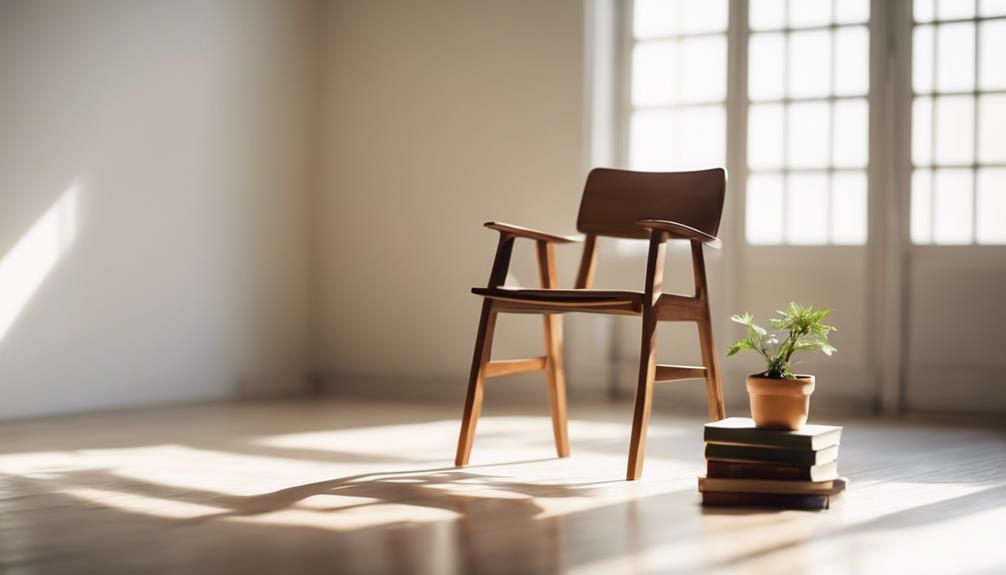Embracing minimalism can truly transform your life. Start by decluttering one room at a time, focusing on what matters most to you. Toss out old magazines in your living room, unused items in your kitchen, and unworn clothes in your bedroom. This process reduces stress and helps you appreciate the essentials more. Implement the 'One In, One Out' rule to maintain balance. Also, don't forget about digital clutter—delete unused apps and organize your files. Each small step leads to greater focus and tranquility. Discover even more tips that can guide your minimalist journey toward a simpler, more fulfilling life.
Key Takeaways
- Start with one room at a time to avoid feeling overwhelmed and make quick progress in decluttering.
- Apply the 'One In, One Out' rule to maintain balance in your possessions and prevent future clutter.
- Set specific deadlines for decluttering sessions to keep yourself accountable and motivated throughout the process.
- Focus on experiences over material goods, reflecting on what truly adds value to your life.
Understanding Minimalism
Minimalism invites you to embrace simplicity by shedding excess and focusing on what truly matters in your life. It encourages you to reflect on your possessions and prioritize experiences over material goods.
By adopting a minimalist mindset, you free yourself from the distractions of clutter, allowing for greater clarity and peace. You'll find that letting go of unnecessary items not only creates a more organized space but also cultivates a sense of freedom.
Minimalism isn't just about physical possessions; it extends to your time and energy, urging you to cut out commitments that don't serve your values.
Ultimately, this lifestyle fosters a deeper connection with yourself and the world around you, leading to a more fulfilling existence.
Room-by-Room Decluttering Tips
To effectively tackle clutter, approach your home one room at a time, focusing on specific areas that need the most attention.
Start with these key strategies:
- Living Room: Remove old magazines, broken lamps, and underutilized furniture to create a more inviting space.
- Kitchen: Clear out junk drawers, expired food, and dust-collecting appliances to enhance functionality.
- Bedroom: Eliminate clothing not worn in two years, unread books, and unused exercise equipment to promote relaxation.
Benefits of Minimalist Living

Embracing a minimalist lifestyle can significantly reduce stress and simplify your living environment. By removing excess clutter, you create a peaceful space that promotes clarity and focus. You'll find that living with less allows you to appreciate the things that truly matter. Additionally, maintaining a minimalist home involves less cleaning and organizing, giving you more time to enjoy life.
Here's a quick look at the benefits:
| Benefit | Explanation |
|---|---|
| Reduced Stress | A decluttered space fosters tranquility. |
| Enhanced Focus | Less distraction leads to increased productivity. |
| More Time | Fewer items mean less maintenance time. |
Adopting minimalism can lead to a more fulfilling and intentional life.
Strategies for Effective Decluttering
Finding effective strategies for decluttering can help maintain the benefits of a minimalist lifestyle while creating a more organized and enjoyable living space. Start by focusing on manageable tasks to avoid feeling overwhelmed.
Here are three strategies to kickstart your decluttering journey:
- Tackle One Room at a Time: Concentrate on one area to see quick progress and keep your motivation high.
- Implement the 'One In, One Out' Rule: For every new item you bring in, let go of an existing one to maintain balance.
- Set a Timeline: Give yourself specific deadlines for each decluttering session to stay accountable and on track.
Digital Decluttering Essentials

Digital decluttering simplifies your online life and helps you regain control over your digital space. Start by deleting unused apps and files that clutter your devices. Organizing your digital photos and emails can also make a huge difference. Consider reviewing your email subscriptions and unsubscribing from those you no longer read. Utilizing cloud storage can help you manage important documents effectively while keeping them backed up. Here's a quick reference table to guide your digital decluttering:
| Action | Benefit |
|---|---|
| Delete unused apps | Free up storage |
| Organize photos | Easier access and sharing |
| Unsubscribe from emails | Less digital noise |
Managing Seasonal Items
How do you effectively manage seasonal items to prevent clutter and maximize space in your home?
Start by assessing what you truly need each season. Here's a simple strategy:
- Limit Holiday Decorations: Keep only the essentials that bring you joy. Consider donating or selling the rest.
- Rotate Seasonal Clothing: Store off-season clothes in clearly labeled bins, making it easy to swap when the weather changes.
- Evaluate Outdoor Gear: Assess your outdoor equipment and keep only what you use regularly. Donate or sell any unnecessary items.
Handling Sentimental Possessions

Evaluate the emotional attachment to your sentimental possessions to determine what truly deserves to be kept. Ask yourself if each item brings joy or meaningful memories, or if it's simply taking up space.
Consider taking photos of items instead of keeping them; this way, you preserve the memories without the clutter. Create a memory box for only the most significant items, limiting the space to avoid overwhelm.
Discuss shared sentimental items with family; this can help you gauge their importance and make decisions together. Remember, it's okay to let go of things that no longer serve you, even if they once held meaning.
Prioritize quality over quantity in your sentimental collection.
Eco-Friendly Decluttering Practices
Embracing eco-friendly decluttering practices not only clears your space but also benefits the environment by promoting responsible disposal and reuse of unwanted items. You can make a positive impact by following these three steps:
- Donate: Give usable items to local charities or thrift stores, ensuring they find a new home rather than ending up in a landfill.
- Recycle: Research local recycling programs to properly dispose of items that can be recycled, like electronics and paper.
- Upcycle: Get creative by repurposing items instead of tossing them. Transform old furniture into new decor or use glass jars for storage.
Conclusion
Now that you've got the tools and strategies to declutter your life, it's time to roll up your sleeves and dive in. Start small by focusing on one area at a time, whether it’s your physical space, digital clutter, or emotional baggage. As you progress, you’ll notice how creating order can help you rediscover a sense of control and even revive after emotional setbacks. Remember, decluttering isn’t just about tidying up — it’s about creating room for what truly brings joy and meaning to your life.
Embracing minimalism isn't just about tossing things out; it's about making room for what truly matters. You'll find that less really is more, leading to a calmer, more focused existence.
So, don't wait any longer—take the plunge and start your journey towards a serene and intentional living space today!










